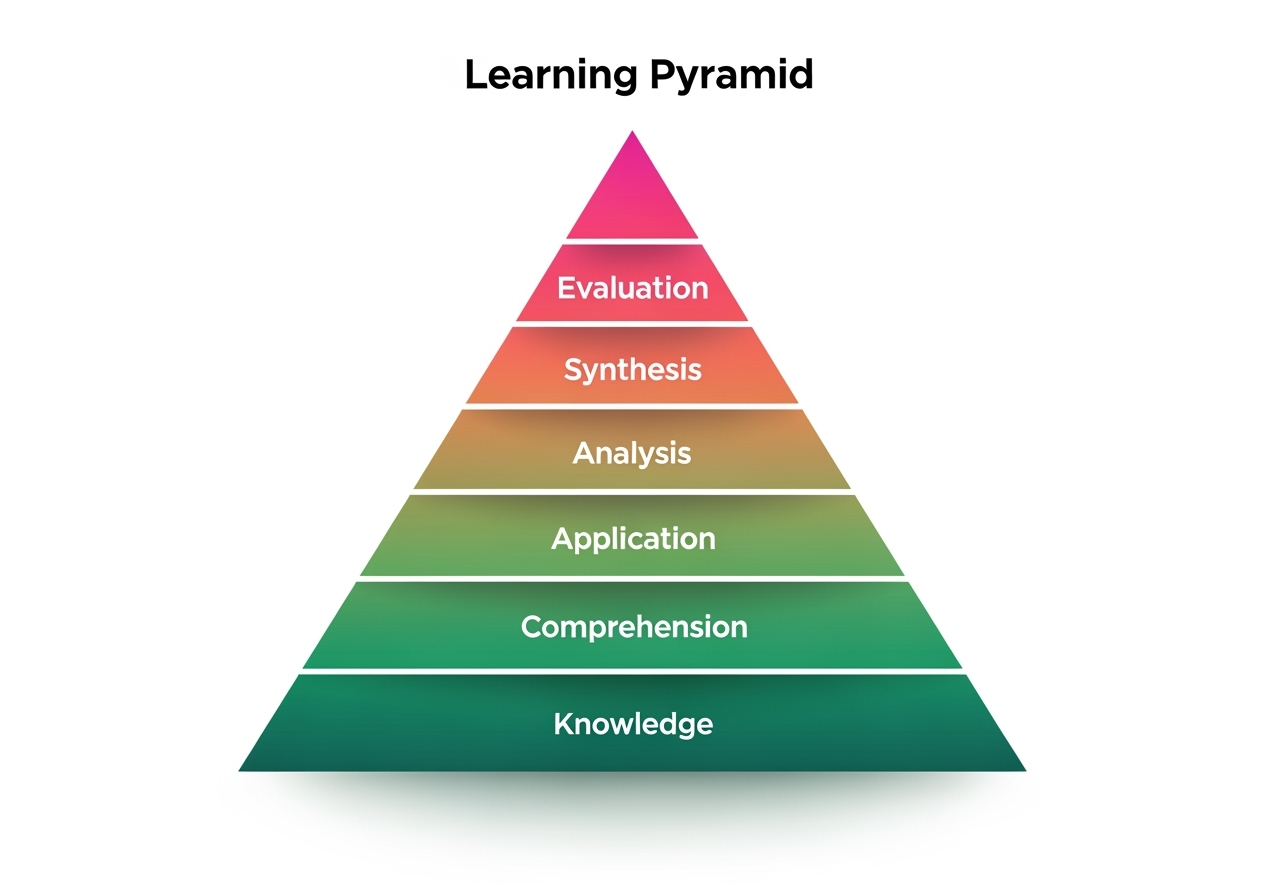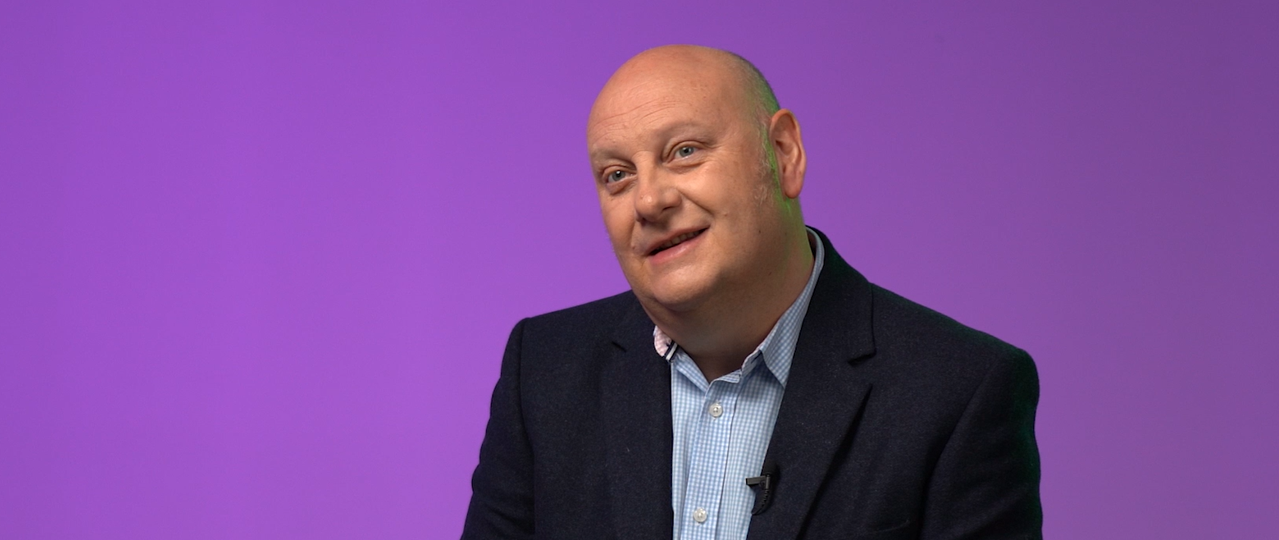How moving up the learning pyramid transforms your team from knowing to doing

We've all been there. You send your team on a training course, they come back enthusiastic about what they've learned, and then... nothing changes. The same old habits persist, the same challenges remain, and you're left wondering where your training investment went.
The problem isn't the training itself - it's that most programmes stop at the wrong level of the learning pyramid.
The Learning Pyramid: From Knowledge to Transformation
Benjamin Bloom's taxonomy, often visualised as a learning pyramid, shows us exactly where most training goes wrong. At the base sits knowledge - the facts, theories and concepts that form the foundation of any skill. Move up a level and you'll find comprehension - understanding how these concepts work together. Higher still is application - the ability to use this knowledge in controlled situations.
But here's where most training programmes end, and where real learning should begin.
The upper levels of Bloom's pyramid - analysis, synthesis, and evaluation - are where knowledge transforms into behaviour. This is where your delegates don't just know what good leadership looks like; they instinctively adapt their approach based on their team's needs. They don't just understand delegation principles; they naturally identify the right tasks for the right people.

Why Skills Without Behaviour Change Fail
Think about learning to drive. You can memorise the Highway Code, understand how a clutch works and even practice gear changes in a stationary car. But until you're navigating real traffic, making split-second decisions and developing the muscle memory that comes with experience, you're not really driving - you're just going through the motions.
The same applies to management training. Delegates might leave knowing the four stages of team development, but do they recognise when their team is stuck in the storming phase? They might understand the theory of difficult conversations, but will they actually have that conversation with their underperforming team member?
The Challenge of Changing Behaviour
Here's the uncomfortable truth: changing behaviour is hard. Really hard. We're fighting against years, sometimes decades, of ingrained habits and responses. Your brain has created neural pathways that make your current behaviours feel automatic and comfortable. Asking someone to change how they manage, how they communicate or how they make decisions isn't just about learning new skills - it's about rewiring fundamental patterns of thought and action.
Research shows that even when people are highly motivated to change, the failure rate is staggering. Studies indicate that up to 92% of people fail to achieve their goals, even when they're initially committed to change. Think about New Year's resolutions or how many people revert to old habits after initially successful diet or exercise programmes. Management behaviour change faces the same challenges, but with added complications: workplace stress, time pressure and the fear of looking incompetent whilst learning.
This is why traditional training often fails. It assumes that knowledge plus good intentions equals behavioural change. But knowing what to do and actually doing it consistently, especially under pressure, are entirely different challenges.
Why Behavioural Change Matters More Than Ever
Despite these challenges, behavioural change isn't optional - it's essential. The world of work is reaching an inflexion point. And the managers who will succeed aren't just those with the most knowledge; they're those who can adapt their behaviour to meet new challenges. They can shift from directive to coaching styles as situations demand. They can have difficult conversations when needed, not just when they feel comfortable.
The organisations that invest in genuine behavioural change don't just see improved individual performance - they create cultures where good management becomes the norm, not the exception.
The Sun Bear Approach: Building Behaviours That Stick
This is why our training programmes at Sun Bear Consulting are structured differently. We don't just deliver content and hope for the best. Our bootcamp-plus-follow-up model is specifically designed to move delegates up Bloom's pyramid and tackle the real challenges of behavioural change. The intensive bootcamp gets everyone to the application level quickly - they're not just learning about situational leadership; they're practicing it through role-plays and real scenarios. But the real magic happens in our follow-up group coaching sessions.
These sessions are where application becomes analysis and where we address the inevitable challenges of changing ingrained behaviours. Delegates bring real challenges from their workplace - the times when they reverted to old habits, the situations where they struggled to apply what they'd learned. We work together to evaluate what's working, what isn't and crucially, why behavioural change is so difficult.
This isn't just about learning techniques; it's about building the self-awareness and resilience needed to change how you operate as a leader, even when it feels uncomfortable.
Measuring What Matters
Traditional training evaluation focuses on satisfaction scores and knowledge retention. But if we're serious about behavioural change, we need to measure differently. Are your managers having more effective one-to-ones? Are they delegating more effectively? Are their teams more engaged?
These are the metrics that matter - not because they're easy to measure, but because they represent real transformation.
The Bottom Line
Skills are the foundations, but behaviour is the building. When you invest in training that moves beyond knowledge transfer to genuine behavioural change, you're not just improving individual performance - you're transforming your organisational culture.
The question isn't whether your team knows what good management looks like. The question is, are they living it, consistently, even when it's difficult?
Ready to move beyond skills training to genuine behavioural transformation? Our Leadership & Management programme is designed to create lasting change, not just temporary enthusiasm. Get in touch to discuss how we can help your team climb the learning pyramid.




